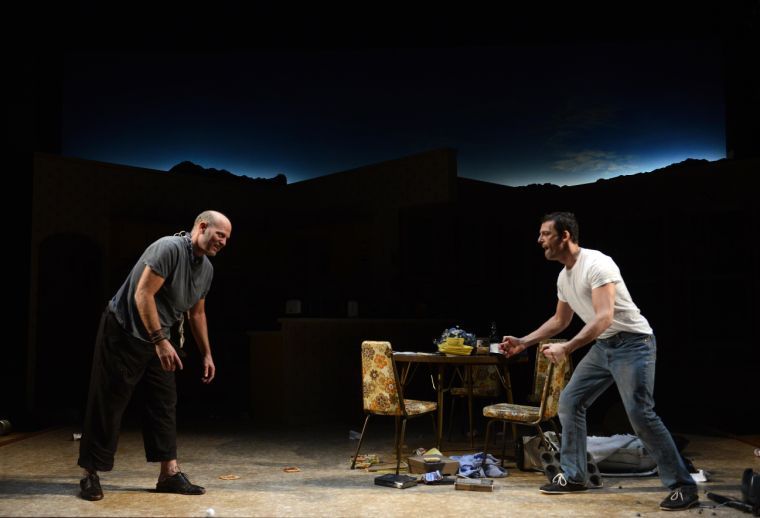Pittsburgh Public Theater’s ‘True West’ suffers from campy excess
November 14, 2013
Sam Shepard’s “True West,” which is being performed at the Pittsburgh Public Theater through Dec. 8, is a brilliant, darkly comic play about envy, alcohol and that classic pastime of searching for something real amid the glitz and glimmer of Hollywood.
First and foremost, however, it is a tale of sibling rivalry. Austin (Ken Barnett), a solid-jawed, Ivy-League-educated screenplay writer, is forced to contend with his boorish, vagabond brother, Lee (David Mogentale), who after spending months in the desert has decided to turn up at their mother’s Los Angeles home while Austin is housesitting.
Not content to simply swill beers, steal electronics and berate his younger brother, Lee decides that, despite his inability to properly spell or speak, he has a vision for a true, modern-day Western film that would blow any Hollywood executive away. He enlists his reluctant brother’s help, and their foray into co-writing becomes a drunken clash of egos and a slapstick battle of wills that consumes them both.
The farce unfolds upon a magnificently designed stage that captures every iota of a suburban 1970s Los Angeles feel. The ubiquitous use of beige across the set — from the heinous floral wallpaper to every part of a distinctively retro kitchen — convincingly transports viewers to a bygone era.
But for all the talk on stage about the importance of believable and authentic writing, Pittsburgh Public Theater’s rendition of the famed play is a far better exemplar of a slightly different lesson: Good writing only takes you so far.
In the case of this particular show, it wasn’t nearly far enough.
What’s peculiar about the shortcomings of this rendition of Shepard’s beloved black comedy is that the reasons for its failings are difficult to pinpoint. Rather than an obvious miscalculation of one’s role by an individual actor, the show as a whole appeared to suffer from a certain campy excess that swallowed up every nuance of the script.
The result is a fumbling, overacted piece in which each performer was frequently more caricature than character. As Austin, Barnett isn’t quite so much a brilliant Ivy League grad as he is a cartoonist’s sketch of one. His mannerisms, tone and body language all indicate an actor attempting to look pompous, causing his character to frequently come across as exaggerated and fake.
Somehow, Austin’s entire package doesn’t feel requisitely human enough. Though we see him plead with film producer Saul Kimmer (Dan Shor) not to pass on his screenplay for his family’s sake, the family and the desperation never become truly vivid — his pleas are merely another contrived aspect of an empty performance by a seemingly talented actor. It is only when he is drunk that Austin truly feels like the sort of flawed, insecure human being that anyone in the audience can relate to.
Mogentale’s performance as Lee fares slightly better.
His every aesthetic detail — from his dirty trench coat to the heels of his sockless feet sticking out of worn-out dress shoes — is impeccable, and his forceful, always-obnoxious delivery is reminiscent of every unpleasant conversation on public transportation the audience has ever experienced. In the play’s opening scene, he leans into Austin after several painful minutes of fishing for arguments, and, in a moment of near self-awareness, asks, “Am I bothering you?”
This does not mean, however, that Mogentale’s performance doesn’t suffer from the same sort of crudeness and clumsiness as Barnett’s. Rather, Lee seems to thrive on the same crudeness that is so troublesome for a portrayal of Austin. Though he often fails to nail the play’s most poignant lines, it is easy to chalk this up to the character’s obliviousness rather than the actor’s carelessness.
When combined with the play’s indulgent use of a cliched Western soundtrack, these slightly tone-deaf performances ultimately give viewers a sense of a play that is not quite fully realized. The style’s there from floor to ceiling. The substance of the show, however, is nowhere to be found.








